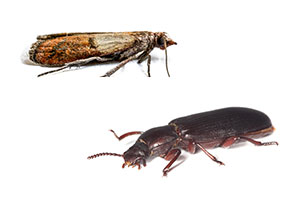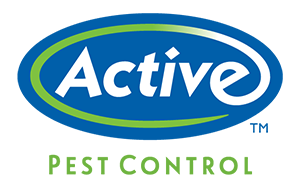
Stored product insects are year-round pests and we’re providing you with 7 tips to prevent them! It’s that time of year when people start organizing their pantry and baking supplies. Unfortunately, this is also the time of year that people discover that they have pantry pests. A number of insects are infamous for raiding pantries to infest flour, dried fruit, cake mixes, grains, and more.
To keep pantry pests (also known as stored product pests) out of your Georgia home this year, keep reading to learn Active Pest Control’ expert tips!
7 Tips to Prevent Pantry Pests
Before you use your baking supplies, it’s important to check for pantry pests. There are 7 ways you can prevent pantry pests:
- Invest in proper storage: Always store food and baking ingredients in airtight containers to keep pests out.
- Properly store seasonal items: Dried foliage, Indian corn, and other seasonal items should be kept in sealed containers while not in use throughout the year.
- Use bay leaves: Stick a bay leaf inside canisters of dry goods like flour, rice, and other grains. The smell of bay leaves may help to repel pests.
- Inspect your groceries: At the grocery store, be careful of purchasing items that appear damaged or used, and do not bring them back to your home.
- Check for expiration dates: Before you use your ingredients from a year or two ago, make sure to check the expiration date and toss any expired items.
- Keep a clean kitchen: Always wipe up spills or messes to avoid attracting pests.
- Seal cracks: Inspect your property for cracks or crevices through which pests may come indoors, and seal them properly.

What Types of Pantry Pests Are There?
Some of the most common pantry pests include ants, earwigs, weevils, pillbugs, Indian meal moths, and confused flour beetles. All of these pests prefer different things to infest, including flour, grains, cake mixes, candy, chocolate, nuts, and dried fruit.
When you have a beetle or moth infestation, all four stages of their development (egg, larva, pupa, and adult) may be seen. For the most part, most people don’t notice the infestation until insects have reached the adult stage. No matter the type of pantry pest, it’s important to act quickly when you find them.
Pantry Pest Extermination
If you’ve followed all the preventative tips to prevent pantry pests and still have an infestation, it’s time to call a pantry pest exterminator! The pantry pest extermination team at Active Pest Control can help remove the infestation and protect your property from pantry pests in the future.

